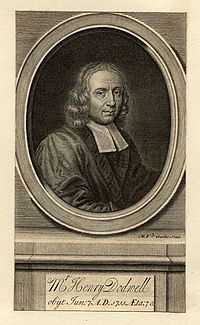Henry Dodwell

Henry Dodwell (October 1641 – 7 June 1711) was an Anglo-Irish scholar, theologian and controversial writer.
Life
He was born in Dublin, Ireland. His father, William Dodwell, lost his property in Connacht during the Irish rebellion and settled at York in 1648. Henry received his preliminary education at the free school there.
In 1654 he was sent by his uncle to Trinity College, Dublin, where he subsequently became a scholar and fellow, receiving the Bachelor of Arts (1662) and Master of Arts (1663). Having conscientious objections to taking orders, he relinquished his fellowship in 1666, but in 1688 he was elected Camden professor of history at Oxford. In 1691 he was deprived of his professorship for refusing to take the oath of allegiance to William and Mary.
Dodwell retired to Shottesbrooke in Berkshire to be near his friend, Francis Cherry. Never countenancing the continuation of the nonjuring schism, Dodwell returned to the Church of England in 1710, following the death of William Lloyd, the deprived bishop of Norwich and Thomas Ken's decision to relinquish his claim to the see of Bath and Wells.
He died at Shottesbrooke.
Works
Living on the produce of a small estate in Ireland, he devoted himself to the study of chronology and ecclesiastical polity, providing a defence of the deprived nonjuring bishops. Edward Gibbon speaks of his learning as "immense," and says that his "skill in employing facts is equal to his learning," although he severely criticizes his method and style. Dodwell's works on ecclesiastical polity are more numerous than those on chronology.
In his ecclesiastical writings he was regarded as one of the greatest champions of the non-jurors; but the doctrine which he afterwards promulgated, that the soul is naturally mortal, and that immortality could be enjoyed only by those who had received baptism from the hands of one set of regularly ordained clergy, and was therefore a privilege from which dissenters were hopelessly excluded, did not strengthen his reputation.
His chief works on classical chronology are:
- A Discourse concerning Sanchoniathon's Phoenician History (1681)
- Annales Thucydidei et Xenophontei (1702)
- Chronologia Graeco-Romana pro hypothesibus Dion. Halicarnassei (1692)
- Annales Velleiani, Quintilianei, Statiani (1698)
- a larger treatise entitled De veleribus Graecorum Romanorumque Cyclis (1701).
Family
His eldest son Henry Dodwell the younger (d. 1784) was the author of a pamphlet entitled Christianity not founded on Argument, to which a reply was published by his brother William Dodwell (1709–1785), who was concurrently engaged in a controversy with Conyers Middleton on the subject of miracles.
Notes
References
- Theodor Harmsen, ‘Dodwell, Henry (1641–1711)’, Oxford Dictionary of National Biography, Oxford University Press, Sept 2004
- Attribution
-
 This article incorporates text from a publication now in the public domain: Chisholm, Hugh, ed. (1911). "Henry Dodwell". Encyclopædia Britannica (11th ed.). Cambridge University Press, endnotes:
This article incorporates text from a publication now in the public domain: Chisholm, Hugh, ed. (1911). "Henry Dodwell". Encyclopædia Britannica (11th ed.). Cambridge University Press, endnotes:
- The Works of H. D. ... abridg'd with an account of his life, by F Brokesby (2nd ed., 1723)
- Thomas Hearne, Diaries
|